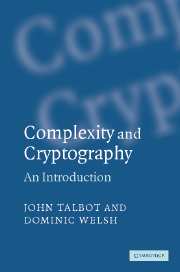Book contents
- Frontmatter
- Contents
- Preface
- Notation
- 1 Basics of cryptography
- 2 Complexity theory
- 3 Non-deterministic computation
- 4 Probabilistic computation
- 5 Symmetric cryptosystems
- 6 One way functions
- 7 Public key cryptography
- 8 Digital signatures
- 9 Key establishment protocols
- 10 Secure encryption
- 11 Identification schemes
- Appendix 1 Basic mathematical background
- Appendix 2 Graph theory definitions
- Appendix 3 Algebra and number theory
- Appendix 4 Probability theory
- Appendix 5 Hints to selected exercises and problems
- Appendix 6 Answers to selected exercises and problems
- Bibliography
- Index
6 - One way functions
Published online by Cambridge University Press: 06 July 2010
- Frontmatter
- Contents
- Preface
- Notation
- 1 Basics of cryptography
- 2 Complexity theory
- 3 Non-deterministic computation
- 4 Probabilistic computation
- 5 Symmetric cryptosystems
- 6 One way functions
- 7 Public key cryptography
- 8 Digital signatures
- 9 Key establishment protocols
- 10 Secure encryption
- 11 Identification schemes
- Appendix 1 Basic mathematical background
- Appendix 2 Graph theory definitions
- Appendix 3 Algebra and number theory
- Appendix 4 Probability theory
- Appendix 5 Hints to selected exercises and problems
- Appendix 6 Answers to selected exercises and problems
- Bibliography
- Index
Summary
In search of a definition
Having considered classical symmetric cryptography in the previous chapter we now introduce the modern complexity theoretic approach to cryptographic security.
Recall our two characters Alice and Bob who wish to communicate securely. They would like to use a cryptosystem, in which encryption (by Alice) and decryption (by Bob using his secret key) are computationally easy but the problem of decryption for Eve (who does not know Bob's secret key) should be as computationally intractable as possible.
This complexity theoretic gap between the easy problems faced by Alice and Bob and the hopefully impossible problems faced by Eve is the basis of modern cryptography. In order for such a gap to exist there must be a limit to the computational capabilities of Eve. Moreover it would be unrealistic to suppose that any limits on the computational capabilities of Eve did not also apply to Alice and Bob. This leads to our first assumption:
Alice, Bob and Eve can only perform probabilistic polynomial time computations.
So for Alice and Bob to be able to encrypt and decrypt easily means that there should be (possibly probabilistic) polynomial time algorithms for both procedures.
But exactly how should we formalise the idea that Eve must face a computationally intractable problem when she tries to decrypt an intercepted cryptogram without Bob's secret key?
- Type
- Chapter
- Information
- Complexity and CryptographyAn Introduction, pp. 125 - 140Publisher: Cambridge University PressPrint publication year: 2006



